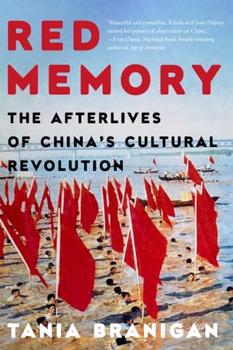Summary | Excerpt | Reviews | Beyond the Book | Readalikes | Genres & Themes | Author Bio

The Afterlives of China's Cultural Revolution
by Tania Branigan
It was Chow's story that brought me to Xu's studio. I had heard it from her husband, an investor and astute political observer; we'd met for lunch at an Italian bistro, where we ate grilled sandwiches, swapped gossip and picked over recent developments in Beijing. Then, over coffee, he mentioned a trip that the couple had made a few years before, to the village where Chow's father had been held. The farmers had been kind enough when the family returned. They still remembered the young man from all those years ago. They recalled how quiet he had been that morning. They spoke of recovering his body from the tracks, and burying it close by. But they dismissed the family's quest to reclaim him – struggled to even comprehend it. Too many bones from those days lay jumbled in the soil. How did anyone expect them to know which one of the bodies was his?
It was a cruel tale, but not the worst I had heard from the era. Perhaps that was why it haunted me. I knew that the ten years of the Cultural Revolution, which ended only after Mao Zedong's death, were savage, unrelenting and extraordinarily destructive. The violence and hatred terrorised the nation, annihilated much of its culture and killed key leaders and thinkers. The movement was an emperor's ruthless assertion of power, which Mao directed and set in motion to destroy opposition within the Party. But it was also an ideological crusade – a drive to reshape China's hearts and souls as he had transformed its politics and economy. People were to be remade or removed. At his spark, an equally ardent mass movement blazed up. Thanks to these contrasting, sometimes conflicting aspects, it was truly universal. Its victims included Mao's two heirs apparent and some of the country's most revered artists and scholars, but also schoolchildren and impoverished farmers in remote provinces. No part of the land remained untouched; no part of the people unscathed. The campaign was bent upon spiritual purity, and the true realisation of the perfect communist society, erasing the bourgeois contamination which had tainted the Party – and the country it ruled – since taking power in 1949. It drew upon idealism and hope. It was also fired by banal grudges and personal ambition, as people seized the moment for their advantage. The frenzy of the movement obliterated temples and relics and closed schools and universities. It tore apart families and friendships.
Yet until that lunchtime conversation, the Cultural Revolution had been history; a jumble of terror and absurdity, sadistic violence and stylised propaganda films, with ballerinas porting bayonets. I knew the facts but hadn't truly grasped how recent this all was, nor how close. Though I'd read accounts of the era, its horrific excesses – which extended, in places, to cannibalism and mass killings – belonged in another world. However documented, however graphic, they were too terrible to be quite real. Chow's story jolted me. This was prosaic in its horror, and only an arm's-length away – so immediate it came up over coffee, so commonplace that people wondered why you'd bother searching for a body. It was a woman not much older than me who had lost her father before she could crawl, knowing him only as a handful of photos and stories. It was a woman who lived each day in the consciousness of that absence – so that, although now a mother herself, she could not imagine what it would mean to have that space filled; she would be, she thought, another person entirely.
This wasn't history. It was life.
Excerpted from Red Memory by Tania Branigan. Copyright © 2023 by Tania Branigan. Excerpted by permission of W.W. Norton & Company. All rights reserved. No part of this excerpt may be reproduced or reprinted without permission in writing from the publisher.
Your guide toexceptional books
BookBrowse seeks out and recommends the best in contemporary fiction and nonfiction—books that not only engage and entertain but also deepen our understanding of ourselves and the world around us.